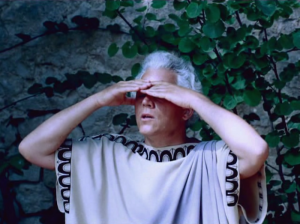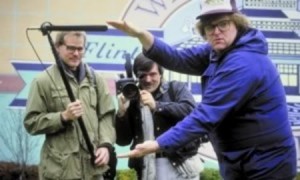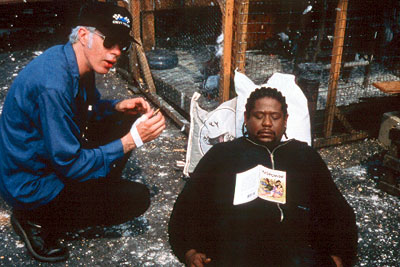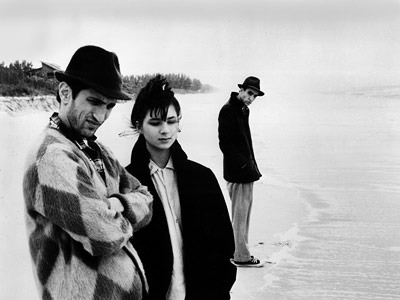From the Chicago Reader (December 2, 1988); also reprinted in my collection Essential Cinema. — J.R.

THE DEATH OF EMPEDOCLES
**** (Masterpiece)
Directed and written by Jean-Marie Straub and Daniele Huillet
With Andreas von Rauch, Howard Vernon, William Berger, Vladimir Baratta, Martina Baratta, and Ute Cremer.

Three pretentious but relevant quotes: “Aesthetics are the ethics of the future” (Lenin). “To make a revolution also means to put back into place things that are very ancient but forgotten” (Charles Peguy). “When the Green of the Earth Will Shine Freshly for You” (Jean-Marie Straub and Daniele Huillet’s subtitle for The Death of Empedocles).

For spectators who don’t know what to do with their films, Jean-Marie Straub and Daniele Huillet offer a rigorous program that’s all work and no play — a grueling process of wrestling with intractable texts, often in languages that one doesn’t understand, without the interest provided by easy-to-read characters or compelling plots. But in fact every one of Straub-Huillet’s 15 films to date (10 features and 5 shorts) offers an arena of play as well as work, and opportunities for sensual enjoyment as well as analytical reflection. To find this arena of play and pleasure, one has to go beyond what we usually associate with the enjoyment of culture–beyond parameters that are usually limited by mutually exclusive notions of “art,” “entertainment,” “education,” and “scholarship,” notions that generally make us smile or groan in advance, regardless of what is placed in front of us. Read more
From the Chicago Reader (February 2, 1990). — J.R.

ROGER & ME
*** (A must-see)
Directed and written by Michael Moore.

There’s no question that you should see Roger & Me if you haven’t already. Michael Moore’s comic documentary about the devastation of Flint, Michigan, resulting from General Motors’ massive plant closings and job layoffs is the most entertaining American documentary to come along in years. Better yet, Roger & Me is radical in its angry critique of the Reagan era — its legacy of corporate greed and its cheerful heartlessness — in a way that makes contemporary Hollywood movies seem cowardly and conformist.
The story of how Michael Moore, a journalist from Flint with no prior filmmaking experience, financed his first feature is an American success story with an inspirational value all its own. Moore sold his house and furnishings, organized local bingo games, invested his settlement from a wrongful-discharge lawsuit against Mother Jones (where he briefly served as editor), and collected hundreds of small investments from Michigan residents to raise his $160,000 budget. After the film became a popular hit and prizewinner at several film festivals last fall, it was picked up by Warners for $3 million and is already well on its way to becoming an independent sleeper. Read more
From The Guardian, August 27, 2004, where this appeared under the title “Independence Day”. — J.R.

It’s an enduring and endearing paradox of Jim Jarmusch’s art as a writer-director that even though it may initially come across as a triumph of style over content, it arguably turns out to be a victory of content over style. The humanism of this mannerist winds up counting for more than all his stylistic tics, thus implying that his manner may simply be the shortest distance between two points.
Maybe it’s the ultimate paradox of minimalism: the less your work does and is, the more these things matter. In Jarmusch’s case, this partially means that the very notions of hipness and independence that originally defined his stylish filmmaking in the 80s — with Permanent Vacation (1980), Stranger Than Paradise (1984) Down by Law (1986), and Mystery Train (1989) — started working against his public profile in the 90s, especially once being outside the mainstream started being regarded with greater suspicion.

Furthermore, around the time of Jarmusch’s Night on Earth (1992), released the same year as Reservoir Dogs, hipness and independence as values within American culture had both become somewhat muddled and coarsened in the process of becoming mainstreamed. Read more







